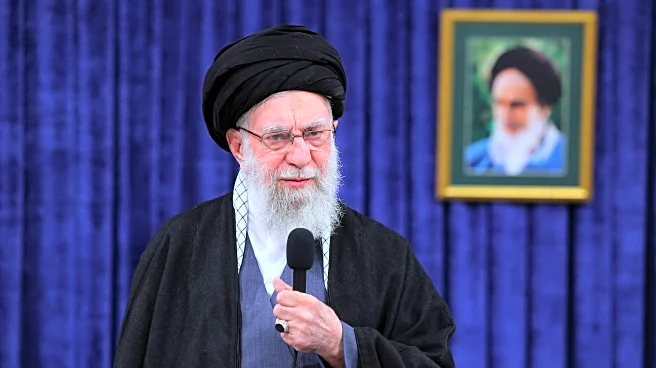What's Happening?
President Trump has implemented tariffs on India with the intention of pressuring Indian Prime Minister Narendra Modi to cease purchasing Russian oil. This move is part of a broader strategy to financially
squeeze Moscow and complicate Russia's ability to fund its military operations in Ukraine. However, these tariffs have also disrupted U.S.-India trade negotiations, prompting India to reconsider its stance on China and explore multi-alignment with major global powers. The Trump administration's foreign policy approach, often described as 'America First,' has been characterized by short-term solutions and dramatic claims of success, despite ongoing challenges.
Why It's Important?
The imposition of tariffs on India by President Trump has significant implications for international relations and trade dynamics. It affects U.S.-India trade talks, potentially altering India's foreign policy and its approach to China. The move also highlights the complexities of Trump's foreign policy, which prioritizes immediate outcomes over long-term strategies. This approach could lead to shifts in global alliances, with countries like India seeking to balance relations with multiple powers. The broader impact on U.S. industries and economic stakeholders includes potential disruptions in trade and diplomatic relations, affecting businesses and policymakers.
What's Next?
The foreseeable consequences of President Trump's tariffs on India include potential adjustments in India's foreign policy and trade strategies. Major stakeholders, including political leaders and businesses, may react by exploring new alliances and trade agreements. The ongoing U.S.-India trade talks could face further challenges, requiring diplomatic efforts to resolve tensions. Additionally, the global community may closely monitor the situation, assessing the impact on international trade and geopolitical stability.
Beyond the Headlines
The ethical and cultural dimensions of President Trump's foreign policy approach raise questions about the long-term sustainability of prioritizing short-term gains. The potential for diplomatic shifts and realignments among global powers could lead to changes in international norms and practices. The focus on immediate outcomes may overlook deeper issues, such as the need for comprehensive strategies to address complex global challenges.










